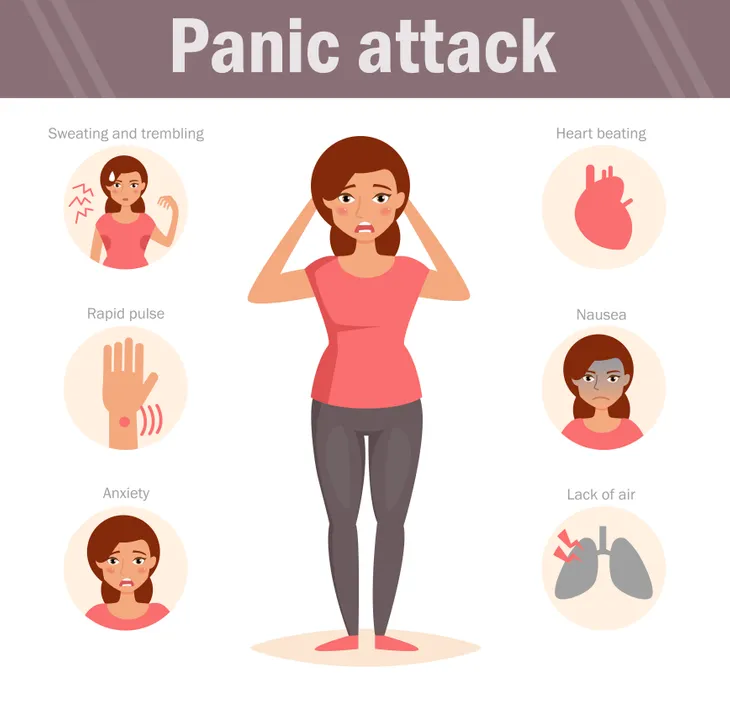A nervous breakdown, also commonly referred to as a mental or emotional breakdown, is used to describe “a situation in which someone cannot function normally because of overwhelming stress,” says Reader’s Digest, citing The Mayo Clinic.
Although the term “nervous breakdown” once referred to a variety of mental illnesses— like anxiety, depression, and acute stress disorder—medical professionals no longer use it. The average person may still refer to their symptoms by this name, so it’s important to discuss the 12 common signs. Be sure to speak to your doctor if you’re experiencing any of the following…
Depression
As mentioned in the article’s introduction, nervous breakdowns typically occur due to extreme amounts of stress, and depression is a common reaction to stress. According to Healthline, a person may experience depressive symptoms, including “loss of hope and thoughts of suicide or self-harm.”
BridgesToRecovery.com adds that an individual may also feel hopeless, be low on energy, and display a lack of interest in their normal activities. Feelings of sadness are also common, along with episodes of crying uncontrollably.
Anxiety
Along with depression, anxiety is another common reaction to intense stress. Women’s Health Magazine says this may come in the form of “constant worry that something bad is going to happen—although you may not be able to pinpoint exactly what’s making you nervous.”
Physical symptoms of anxiety often include trembling, muscle tension, dizziness, and high blood pressure. Reader’s Digest adds that stomach cramping or stomach aches may also occur.
Extreme Mood Swings
If your emotions have been all over the map lately, it may be a sign of an impending nervous breakdown. These emotions are oftentimes overwhelmingly negative, where you “feel uncontrollably angry, helpless, or fearful and even have emotional outbursts or crying spells,” says CureJoy.com.
Although, the source indicates “you may also feel very good about yourself for no reason.” Increased sensitivity is also common, where you take what others say personally, or become easily upset about things that are unrelated to you.
Panic Attacks
In speaking with Prevention, social worker Heather Senior Monroe, MSW, LCSW, says, “Panic attacks can be a warning sign [of a nervous breakdown], especially if they happen frequently within a short period of time.” Mentally, this can mean a person experiences extreme fear, or a detachment from reality and themselves.
Physically, panic attacks can cause symptoms such as sweating, heart palpitations, increased heart rate, nausea, shaking, and dizziness. An affected individual may also experience tightness in their chest that causes them to have trouble breathing.
Paranoia
Are you suddenly worried that someone is watching you or stalking you? It may be a sign that you’re having a nervous breakdown. According to Nikki Martinez, PsyD, LCPC, in speaking with Bustle, this paranoia may be accompanied by auditory or visual hallucinations.
“They may see and hear things that are not there, the voices may be telling them to harm themselves, or that they can not trust others,” she says.
Odd Happenings
Having a nervous breakdown can also cause people to experience strange happenings. These may include flashbacks of a traumatic event, which Healthline says, “can suggest undiagnosed post-traumatic stress disorder (PTSD).”
Additionally, time may seem to speed up or slow down for these individuals. Or they may experience heightened senses of sight, smell, or taste. CureJoy.com adds that people’s voices may also sound strange to them, “For instance, their voice may sound hollow or like there are two people talking at the same time.”
Trouble Concentrating
Having trouble concentrating? It may indicate you’re suffering from a nervous breakdown. Reader’s Digest explains that this is because “chronic stress fries your attention span,” which can affect your ability to concentrate on things like work tasks and driving.
The source adds, “In extreme cases, excessive amounts of the stress hormone cortisol can deteriorate your memory.” Additionally, you may have troubles with problem solving and making decisions and experience disorientation.
Appetite Changes
A nervous breakdown can also affect appetite. While it may cause some people to not eat enough, others might struggle with eating too much.
In the case of those who overeat, it’s not likely that they’re making healthy food choices, either, as “The stress hormone cortisol can trigger cravings for high-fat, high-sugar foods,” says Health.com. While these comfort foods may help you to feel better temporarily, consuming too much of them over time can be bad for your health and may lead to weight gain.
Unusual Sleep Patterns
Changes in a person’s sleep patterns can also be a sign that they’re experiencing a nervous breakdown. “Some people find that they go into sleep overdrive,” says Erin Engle, PsyD, assistant professor of Medical Psychology of Psychiatry at Columbia University Medical Center, in speaking with Health.com.
As stress affects everyone differently, others may struggle with insomnia, where they find themselves lying awake at night “mentally rehearsing situations over and over again that have no solution.”
Indifference and Isolation
As mentioned earlier, people suffering from a nervous breakdown may find themselves disinterested in regular activities, even those they used to enjoy. This is referred to as anhedonia and may extend to everyday tasks such as cleaning and caring for one’s hygiene and appearance. They may also lack care about what they eat, and can go without food for extended periods of time.
In addition, BridgesToRecovery.com says “Someone going through a nervous breakdown may feel isolated and may withdraw from friends and family, worsening that feeling.”
Behavior Changes
When a person is having a nervous breakdown, they may also notice they exhibit a variety of behavioral changes. These may be little things, such as offering short responses in a conversation or becoming easily aggravated.
In some cases, however, there may be more noticeable changes, such as “avoiding social activities, missing days of work, or skipping out on responsibilities,” says BridgesToRecovery.com. Unfortunately, Women’s Health Magazine says that once the individual notices they’re exhibiting these behaviors, they are likely to further distance themselves from you.
Fatigue
As discussed earlier, a nervous breakdown can cause changes to your sleep patterns. In the case of those who suffer from insomnia, specifically, a lack of sufficient shut-eye can cause excessive fatigue, even exhaustion.
Health.com adds that you may also experience weakness in your body and loss of libido. Also, “Activities you previously handled with ease may become increasingly difficult. And things that used to bring you joy may lose their appeal.”















